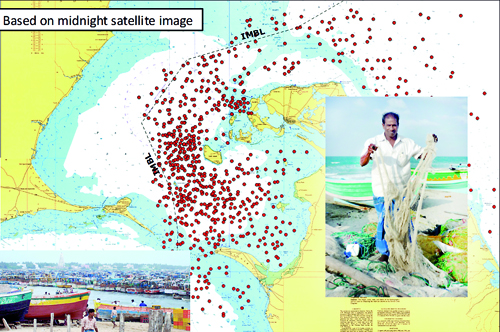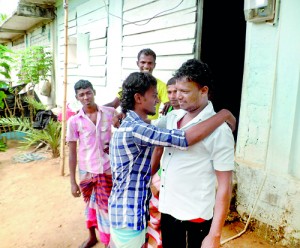News
Post-talks: Poaching as usual in Sri Lankan waters
Indian fishing trawlers that reduced intrusions into Sri Lankan waters after a series of arrests by the Navy last month and early this month have returned to poach in their usual numbers after the conclusion of talks between Fisheries Minister Rajitha Senaratne and his Indian counterpart, a senior Navy official said.
Minister Senaratne was in New Delhi on January 15 and 16 for talks on illegal fishing by Indian and Sri Lankan fishermen. The discussions were preceded and followed by the release of a large number of detained fishermen and boats by both sides.
“When we apprehended the boats, there was a lull,” said Commodore Niranjan Attygalle, Director Naval Operations. “They came in small numbers. During the talks, they waited. But once we committed to exchange (detained fishermen and boats),

Map showing Indian fishermen encroaching on Lankan waters. Slide taken from the presentation of Joeri Scholtens and Prof. A. S. Soosai
they started coming again. They seem to think that the Government has now taken a decision to release them even if they are apprehended.”
Commodore Attygalle was among the participants of a two-day conference on ‘Conflict Resolution and Sustainable Fisheries Governance in the Palk Bay of South Asia’. It was held at the University of Colombo and attracted representatives of Indian and Sri Lankan fishermen as well as academics and researchers from Sri Lanka, India, Norway, South Africa, the Netherlands and Denmark.
The Navy has seen new boats among the Indian fleets that are fishing in Sri Lankan waters, Commodore Attygalle told the Sunday Times. “We don’t have confirmed numbers for how many are newly-built but we have seen new boats,” he said. This could indicate that the trawler fleet was expanding on the Indian side with the Tamil Nadu Government taking little or no action to prevent it. No official figures have been released to quantify this increase.
Commodore Attygalle told the conference that 45,167 Indian trawlers were sighted by the Sri Lanka Navy in 2013. In the first three weeks of this month alone, the Navy documented 1,701 boats off the Sri Lankan coast. These figures were officially recorded by way of radar counts and sightings by Navy patrols on clear days. Rough estimates have been higher. A foreign researcher aired a video clip of Indian trawlers congregating just off the Pesalai coast in Mannar. The footage was filmed by fishermen on shore and showed clusters of boats. This was how close they came to Sri Lanka’s coast, the researcher said. There was no way such an area could be viewed as the traditional fishing ground of Indian fishermen.
Conference participants concurred that Sri Lankan fishermen were worse affected in the ongoing fisheries dispute. But they also agreed that it was unlikely that India and Sri Lanka would have a showdown over this issue.
V. Vivekanandan, the Secretary of the Fisheries Management Resources Centre (FishMARC) in India, has been instrumental in organising fishermen-to-fishermen talks — the latest round of which is scheduled to take place tomorrow. He said one of the main problems for Sri Lanka’s Northern fishermen has been that the two countries did not treat the fishing dispute as a top priority.

Happy reunion: A released Sri Lankan fisherman is greeted by family members in Matara. Pic by Krishan Jeewaka Jayaruk
“Today, if Sri Lanka decides to enforce the border vis-à-vis Indian fishermen, it’s possible,” he said. “You have to line up your Navy and you have to stop it. It can lead to bloodshed and it can lead to various other things. The political fallout in Tamil Nadu would rock India-Sri Lanka relations and I don’t think India and Sri Lanka will allow this to be the main issue for a showdown.”
“That is the problem, in fact, for the fishermen on either side and particularly for fishermen in Sri Lanka’s North,” he continued. “The fisheries issue is not an issue for anybody other than fishermen on either side. The politicians have multiple issues vis-à-vis India and Sri Lanka.”
Mr. Vivekanandan remarked, however, that things were now moving forward and hoped that an interim solution would emerge from fishermen-to-fishermen talks: “Only fishermen can tell each other the truth.” Sri Lanka’s Northern fishermen had unequivocally rejected trawling in the Palk Bay. Therefore, this should be a minimum requirement in any solution that evolves.
But it was pointed out at the conference that the Indian trawler fleet has grown so large and employs so many people — many of them impoverished South Indians who have no alternative mode of survival — that dismantling it poses a serious challenge. The Tamil Nadu Government would have to take bona fide measures to scale down the very fleet it had supported to expand during the last 30 years.
“The growth of the trawling sector is largely a result of (Tamil Nadu) State policy,” said Dr. Ajith Menon from the Madras Institute of Development Studies. “Often we just blame the trawlers. But it was the State that promoted all of this and, therefore, the State needs to actively step forward in trying to address the concerns of the Indian trawlers, especially the smaller ones.”
Joeri Scholtens, a researcher from the University of Amsterdam, said Sri Lanka’s Northern fishermen appreciated the strong stance of the Fisheries Ministry and the Navy in recent months but that there were “trust issues” related to the country’s internal war. The fishing community has failed to create a strong front against “the massive trawler” intrusion because it has been difficult for them to build on their usual political support. The Tamil National Alliance has not espoused its cause.
The response of the fishermen has been “silent adaptation”. In some places, like Pesalai, which is the biggest fishing village in Mannar, one group has shifted to daytime purse-seining instead of their customary night fishing. In Karainagar, they have started fishing closer to the shore on nights that Indian trawlers intrude. Mr. Scholtens said that, after three decades of war, the livelihoods of the Northern fishermen were still heavily compromised.
Retired Senior Diplomat John Gooneratne warned that the fisheries problems Sri Lanka faces vis-à-vis Tamil Nadu and New Delhi would not go away soon. This is primarily because of a politically weak Indian hegemon in New Delhi — the Central Government was helpless against the State Government.
Dr. Gooneratne pointed to a joint statement issued in January 2012 which said the two sides would work towards a ‘Memorandum of Understanding on Development and Cooperation in the field of Fisheries’. Sri Lanka is quite wary of MoUs, he asserted.
“As far as Sri Lanka sees it, there is an established IMBL {International Maritime Boundary Line} between the two countries,” he remarked. “And Indian fishermen coming on to the Sri Lankan side of the IMBL are illegally in Sri Lankan territorial waters. MoUs tend to erode such clear positions.”
There was an armada of Indian fishing vessels crossing into Sri Lankan waters compared to the very small number of Sri Lankan vessels entering Indian territorial waters, Dr. Gooneratne said. “In such a situation, any MoU will be to the benefit of the Indian side, and to the disadvantage of the Sri Lankan side. No MoU will be able to tackle such a disproportionately large fisheries problem.”

